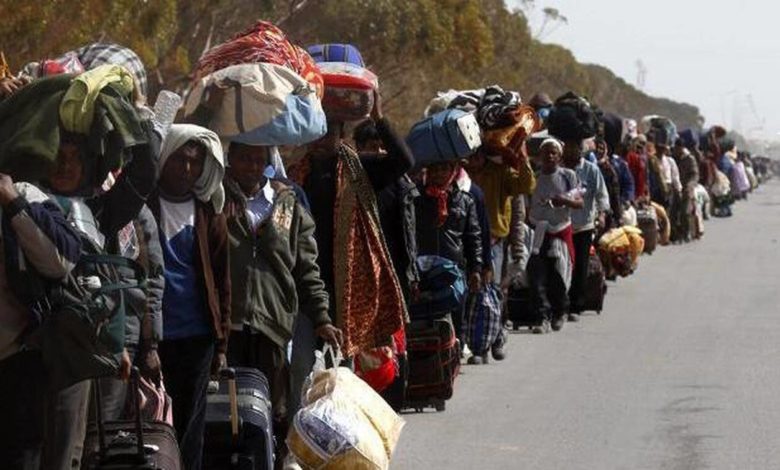Cameroon To Send Delegations To Nigeria To Persuade Refugees To Come Back Home

The Cameroon government, within the next few days, would be sending delegations to the various camps and communities hosting mostly English-speaking Cameroonian refugees fleeing from the insurgency in Anglophone Cameroon.
A decision to this effect was taken last week during a cabinet meeting in Yaounde.
The Cameroonian refugees, who are based mostly in Taraba and Cross River states, have been fleeing the English-speaking regions of the Northwest and Southwest since 2016.
This was following an initial teachers and lawyers protest against Anglophone marginalization escalated into open confrontation between English-speaking separatists and the Cameroon national army.
Since then, more than 60,000 Cameroonians fleeing the conflict have entered into Nigeria’s Taraba and Cross River states, with 8,000 entering Nigeria in February 2020 alone.
Since the decision to send the government delegation to Nigeria was announced, there have been mixed reactions from the local English-speaking populations and Anglophone separatist leaders based mostly in the United States of America and Europe.
While a majority of the local English-speaking Cameroonians are in favour of any initiative that would bring foreclosure to the bigly traumatized, disoriented and dispossessed home communities as well as those forced into abandoning their homes, foreign based Anglophone separatist leaders have been rather hostile to the idea of refugees returning to their home country.
“The success of the initiative would depend on those who would constitute the delegations to be sent to Nigeria.
“If they as usual decide to send members of the ruling CPDM party, then the effort would be doomed to fail. In order for there to be any success, the delegations should comprise members from the various religious denominations such as Catholics, Presbyterians, Baptists, Moslems etc.
“The various humanitarian and human rights organisations both local and international should also be represented in the delegations as well as leaders from the various villages from which the refugees fled.
“Anything short of that is bound to fail,” opines Prof. Victor Julius Ngoh, President of the Catholic University Institute of Buea told HumAngle exclusively, on Thursday.
Though some peace is creeping back to the regions with some displaced persons trickling back to their homes and villages, there is strong opposition within the separatist leaders abroad to the new government initiative to persuade the refugees abroad to come back home.
“The refugees in foreign countries are some sort of trump card for the separatist leaders abroad who use them as evidence of the hostility of the majority Francophone Cameroon government against Anglophones which has forced them to abandon their homes.
“A return of these refugees would be like an indication of the success of the Biya government in bringing peace and security to the English-speaking regions, which would inadvertently signal the failure of the Anglophone insurgency,” according to a Yaounde-based political scientist who opted for anonymity for his own safety.
The continued presence of Anglophone refugees in Nigeria could be perceived as a failure on the part of the Biya government to bring peace to his beleaguered country thus conjuring the voluntary return of the refugees.
There is also the phenomenon of the presence of hundreds of thousands of English-speaking internally displaced persons in French-speaking Cameroon.
“There are presently about 697,000 English-speaking internally displaced persons who fled from their homes in the Northwest and Southwest Regions living in the eight French-speaking Cameroon regions, according to the United Nations High Commission for Refugees.
The Anglophone separatist leaders harp on accusations that the predominantly French-speaking Cameroonian community hates Anglophones.
However, this seems to have been debunked by the fact that a crushing majority of English-speaking Cameroonians fleeing their homes because of the insurgency find refuge but among their French-speaking compatriots.
“How does one explain that?” asks a European diplomat in Yaounde who opted for anonymity because of his diplomatic status.
With the sporadic killings now being perpetrated mostly by Anglophones against Anglophones, the national community as well as the international community are all praying for a quick resolution of this strange misunderstanding.
Support Our Journalism
There are millions of ordinary people affected by conflict in Africa whose stories are missing in the mainstream media. HumAngle is determined to tell those challenging and under-reported stories, hoping that the people impacted by these conflicts will find the safety and security they deserve.
To ensure that we continue to provide public service coverage, we have a small favour to ask you. We want you to be part of our journalistic endeavour by contributing a token to us.
Your donation will further promote a robust, free, and independent media.
Donate HereStay Closer To The Stories That Matter




